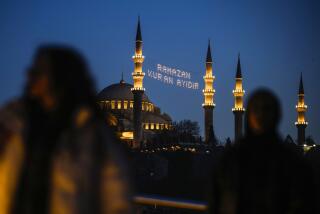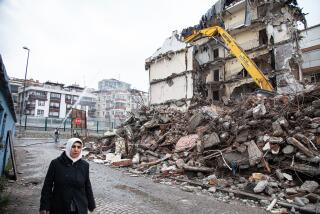Modern Woes Flood Ancient City of Istanbul
ISTANBUL, Turkey — Behind the postcard scenes of the Bosporus, Byzantine churches, ornate mosques and the Covered Bazaar, this exotic bridge between East and West has become a modern city with all the modern problems.
It is fighting a losing battle with poverty, pollution, crime and a constant shortage of money.
The thick walls that kept out invaders when Istanbul was Constantinople are no defense against a flood of rural immigrants to the sprawling city.
Because an estimated 40,000 people arrive every month, the population has doubled in a decade to 9 million.
The newcomers, drawn by dreams of opportunity in a city of gold, threaten Istanbul’s reputation as a cultural and intellectual center.
Its educated middle class yearns for the serene old days of family outings at pleasant tea gardens, of the amiable arguments of old men over waterpipes at roadside cafes.
“Istanbul has simply become a big village. What a shame!” said Gulizar Ustun, who has lived all her 72 years in Istanbul, on the coast of its Asian side.
In illustration, she pointed to fishermen selling their catch on the shore, to street vendors whose pushcarts overflowed with fruits and vegetables, to sellers of sesame rings and ice cream.
The cacophony of chaotic traffic in ancient, winding streets mingle with the whistles of policemen and the siren of a ferry disgorging a multitude from the city’s European side.
Slums advance inexorably in Istanbul. The lack of running water, sanitation, garbage collection and proper streets add to the misery of the millions who live in shantytowns said to house half the city’s population.
Up to 15 people crowd into a single room in the shacks, which are called gecekondu , which means “sprang up in the night.” Most are built on government property, and screaming women try to hold off the bulldozers with clubs, pots and pans or whatever else comes to hand.
“We cannot turn back new arrivals,” Mayor Nurettin Sozen, a Social Democrat, said in response to calls for restrictions. The poor, he added, “have the right to travel and settle where they please.”
Cemile Toksoy, 35, who has eight children and looks 50, said her husband does odd jobs and they are thankful for a shack to live in. They moved to Istanbul two years ago from northeastern Turkey.
Most of the immigrants arrive penniless, having sold everything they owned to pay for the trip.
“We were told the earth and stones were of pure gold here,” said Ayse Katmaz, who waited in a line for brownish water trickling from a rusty tap.
For many young women, dreams of fame and riches end in prostitution. An elderly brothel owner, Mathilde Manoukyan, has surpassed prominent businessmen on the list of the city’s leading taxpayers.
Thousands of children roam the streets, trying to survive. A favorite tactic is collecting fees for parking spaces. Scratched paint or deflated tires are the fees for nonpayment.
The city’s reservoirs go dry in summer, creating misery for rich and poor alike, because there is no money to rebuild the water system.
Land prices have soared. Housing projects replace the forests along the Bosporus, and office towers dwarf delicate minarets.
Sewage, industrial refuse and oil from passing ships increase the pollution in the strait. The waters of the scenic Golden Horn inlet have turned a murky brown.
Militant radicalism and crime compound the problems.
In the last year, extreme leftists have killed scores of policemen, retired generals and intelligence officials. Istanbul is the center of Turkey’s drug traffic and of the prostitution and protection rackets.
Foreign travelers still arrive on luxury liners that drop anchor in sight of the ornate palaces of former sultans, but some distinguished visitors seem as disturbed as Ustun about the decline.
“What have you done to Istanbul?” Prince Philip, husband of Queen Elizabeth II, exclaimed when he arrived in May. He had not visited the city in 10 years.
More to Read
Sign up for Essential California
The most important California stories and recommendations in your inbox every morning.
You may occasionally receive promotional content from the Los Angeles Times.










